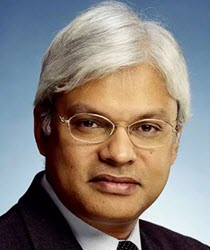Asia's Rise and U.S. Grand Strategy
To preview the forthcoming volume Strategic Asia 2011-12: Asia Responds to Its Rising Powers—China and India, NBR spoke with Strategic Asia Research Director and Senior Associate at the Carnegie Endowment for International Peace, Ashley J. Tellis.
In this interview, Dr. Tellis argues that Asia continues to encounter challenges in many areas despite economic advancement and that an effective U.S. grand strategy is necessary to face the complex international environment in a time of globalization.
Strategic Asia 2010–11: Asia’s Rising Power and America’s Continued Purpose described a shift of power from the United States to Asia, but also made clear that the United States was still relevant in virtually every area. Where in Asia is the U.S. position most challenged?
At the moment, I think the United States is most challenged in terms of its economic capacity. The large amount of U.S. resources that have been dedicated to deleveraging and to the financial recovery will continue to take a toll for quite some time. We will see depressed growth rates and relatively high levels of unemployment, and that will obviously have an impact on political confidence. With respect to the economy, the issue remains the twin deficits: the national budget deficit and the trade deficit. As those issues are addressed, the U.S. position, which is otherwise strong internationally in structural terms, will become even stronger.
U.S. primacy is also challenged in terms of the ease with which the U.S. military can operate on the Asian periphery. Until about a decade ago, the United States essentially possessed uncontested access. It could do whatever it wanted in the vicinity of China without a serious or consequential challenge. I think, over the next decade, we will begin to see a variety of maturing Chinese capabilities that are in effect intended to deny the United States that access. Unless Washington makes concerted efforts to defeat these Chinese capabilities, I think there will be real risks to U.S. extended deterrence and, obviously, with risks to extended deterrence come greater risks to the U.S. position in Asia itself.
Are there sectors where you think the United States is not significantly challenged?
The United States still has a remarkable advantage in soft power. With American symbols and technologies being highly valued throughout Asia, the United States remains the dream society for most of the region. People want to emulate the United States, whereas there are very few countries in Asia that want to become like China. The United States still is untouched when it comes to its capacity for innovation and, more generally, its technological prowess. Those are two things that are not to be underestimated.
The United States also has tremendous advantages in a third area: demography. It has a population pyramid that is very favorable from the point of view of maintaining power. Further, it is an open society that has always benefited from immigration, so the United States can continue to tap into the best talent wherever it is—in Asia or elsewhere.
You mention the United States’ demographic advantage, which of course stands in contrast to challenges faced by many Asian countries. Last year’s Strategic Asia volume focused on specific sectors rather than national stories. What are other cross-cutting trends we have seen in recent years?
There are a huge series of challenges that transcend borders. I would say that the environment, climate change, and freedom of movement in the commons are three areas that pose significant challenges—not only for the United States, but for Asian countries as well. Questions relating to energy, the environment, food, and water will likely dominate decisionmaking in Asia, particularly in the economic and social realms, and could, if unmanaged, actually slow down the region’s growth.
Last year’s volume tracked nuclear development throughout the Asia-Pacific. There are ways in which the development of nuclear energy could affect global climate change, but it has more direct consequences within the security sector. What are the implications of the Fukushima disaster, as well as of the potential nuclear deal between China and Pakistan?
Leading up to the 2010–11 volume, pundits harbored the assumption that nuclear energy would continue to remain a very important component in the Asian energy mix. After the reactor accidents in Japan, I anticipate that there will be a pause, but I don’t think this will by any means be a permanent setback for nuclear power in Asia. The demand for energy is so great that I cannot see the two biggest Asian economies, China and India, scaling back their nuclear expansions plans.
In terms of other energy issues, it is unclear whether China has given up entirely on the mercantilist approach to securing energy—by which it creates privileged political arrangements that earmark a country’s energy resources solely for China. I think Beijing has realized that reliance on the market is the best solution, but there is still a residual temptation to supplement market strategies with some kind of state-driven energy mercantilism. This is a source of concern, because if Chinese ambitions follow a traditional path, they could create problems both between China and the United States and between China and energy consumers such India or Japan. The jury is still out, but my own view is that this situation will be less pressing than people think. At the end of the day, I think the Chinese realize that their interests are better served through accepting a market solution.
A lot of people might be skeptical of the idea of grand strategy, thinking that perhaps globalization, regionalization, or a hub-and-spoke network of bilateral ties produces a more fractured reality. Why is grand strategy still an important way to understand and act in world affairs?
What you are saying is that the traditional way of managing grand strategy has become more complicated, and I fully agree. It is no longer sufficient to think of grand strategy as operating entirely in the realm of politics or strategic affairs. Globalization has reminded us that the foundation of politics and strategy is ultimately economics, and that the productive capacity of a state is the motor that provides the resources that enable it to acquire national power. To that degree, grand strategy has to integrate elements that previously might have been neglected.
I think a good grand strategy has always had room for integrating the economic components of state power. Even before globalization, in a world that was relatively autarkic, states had to think about their material capacities and how they stacked up relative to other actors. The biggest change since globalization is that states must manage competitors and adversaries even while remaining deeply intertwined with them economically. This change has not made grand strategy irrelevant; indeed, it has become even more relevant, as well as a lot more complicated.
The forthcoming edition, Strategic Asia 2011–12: Asia Responds to Its Rising Powers—China and India, explores the perspective of regional actors and examines China’s and India’s relations with other states in the region as well as with the United States. Last year’s volume drew the conclusion that, despite a partial loss of autonomy, the United States remains the only country with “comprehensive national power.” What kind of power, then, are China and India developing?
China and India both seek to develop comprehensive national power, but I do not think they are there yet. At least for a while longer, they will concentrate essentially on GNP growth and ensuring that their overall growth rates stay at relatively high levels. The new volume will show that this is a wise decision because it will be a while before their growth rates translate into the increased per capita income, state capacity, institutional coherence, and military capacity necessary to sustain an international presence that others must be compelled to respect.
This interview was conducted by Graham Webster, a Ph.D. student in political science at the University of Washington.



